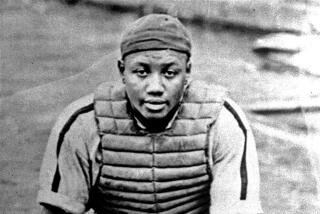Baseball Language Changes With Game
- Share via
NEW YORK — Hall of Fame pitcher Burleigh Grimes never “defaced” the ball. He spat on it.
The vocabulary of baseball has evolved since Grimes, a registered spitballer allowed to throw the pitch after it was outlawed, retired with 270 victories in 1934. The latest crackdown on the pitch he mastered shows baseball’s language has changed more than its playing techniques.
Players today are more sophisticated than Grimes. They may scuff, doctor and even apply saliva, but no active pitcher would stoop to throwing something as crass as a spitball.
The American League suspended Minnesota pitcher Joe Niekro for “defacing” the ball. The penalty failed to stop Kevin Gross of the Philadelphia Phillies from bringing “foreign substances” to the mound.
To be fair to pitchers, Commissioner Peter Ueberroth and the two league presidents put hitters who fix their bats on guard too.
Umpires “impounded” Howard Johnson’s bat twice. Fortunately for the Mets third baseman, the bat was found clean, or as the the National League put it: “X-rays revealed no signs of alterations or tampering.”
Foul play by owners has also been given new names. Commissioner Kenesaw Mountain Landis tried to break up the “chain store system” whereby clubs held the rights to players on minor-league teams. Owners again are suspected of keeping the rights to players who should be free, only now it’s called “collusion.”
Even the language of ordinary play has become increasingly technical in recent years. Pitchers used to throw hard. Today, they have good velocity and their fastballs are timed. The fashionable split-finger fastball, many contend, is the same pitch as the forkball popular in the 1950s.
Sluggers have become power-hitters and no longer deliver mammoth shots and towering blasts. Now that surveyors have measured some ballparks, mathematical formulas provide exact distances of home runs.
Player and team nicknames have changed as well.
The top players in other eras had casual names like Shoeless Joe, The Bambino and Say-Hey. The biggest crowd-pleasers of the 1980s instead have titles like Mr. October and Dr. K.
In the 1920s, the New York Giants were called the McGrawmen and the Philadelphia Athletics were nicknamed the Mackmen after their long-time managers John McGraw and Connie Mack. Managers rarely last with a team long enough to be identified with it today and, under free agency, players make it clear they’re nobody’s man but their own.
More to Read
Go beyond the scoreboard
Get the latest on L.A.'s teams in the daily Sports Report newsletter.
You may occasionally receive promotional content from the Los Angeles Times.










